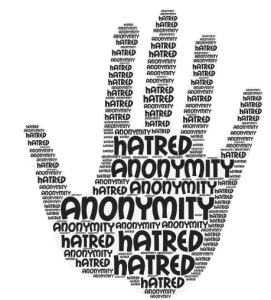 In today’s digital world groups increasingly troll the Internet, depositing easily available and intriguing materials — music, posters, jokes, cartoons, and stories — whose sole purpose is to introduce growing children to hate. Over recent years this readily available propaganda, designed expressly to appeal to teen sarcasm, edgy humor, and musical preferences, strives to look like any other funny or absurd digital content a student might casually discover. Except that it’s not funny.
In today’s digital world groups increasingly troll the Internet, depositing easily available and intriguing materials — music, posters, jokes, cartoons, and stories — whose sole purpose is to introduce growing children to hate. Over recent years this readily available propaganda, designed expressly to appeal to teen sarcasm, edgy humor, and musical preferences, strives to look like any other funny or absurd digital content a student might casually discover. Except that it’s not funny.
It’s also not something for parents to scare. The simple fix is for parents and educators to talk with children, mentoring them, helping them learn to evaluate, guiding them to develop an eagle eye that identifies and filters hateful content — exactly what you teach them to do with any other inappropriate content.
All of us — educators, parents, and especially adolescents — need to know how to recognize this type of information and how to alert others. Hate groups look for vulnerable pre-adolescents and teens from every socioeconomic group. The level of education in a child’s home and an emphasis on values of respect and acceptance may not make a difference if a child, during an especially needy, lonely, or stressful time or through an error in judgment, encounters a clever hate group tactic. Many children are simply attracted by absurdity, laughing at symbols they know little about. That’s also when a group may try, if it has even a bit of personal information, to encourage an adolescent to come back, laugh some more, and maybe even make a friend.
Hate groups have become more active and more visible since President Obama’s 2008 election, but these organizations, some quite small, have courted young people for years. An old, but still relevant Salon Magazine article, Web of Hate, described the problem as it existed on the Internet in 1998, providing a good background. The issue, however, is far more serious today.
The Southern Poverty Law Center (SPLC) spends a considerable amount of its time and money tracking purveyors of hate. Its website features an interactive hate map and also provides first-rate resources that parents, teachers, and religious leaders can use when hateful content surfaces or when it’s necessary to actually fight recruitment tactics. The map, by the way, is an extraordinary teaching tool in itself, but so are the SPLC intelligence files such as this one on the Ku Klux Klan.
Read about the white power racist music industry and some of its recruitment strategies. In an article in the California-based, East Country Magazine, James McElroy, a chairman of the SPLC board comments:
We try to shine a little light on it. Hate is like a fungus under a rock. Shine a light and you can eradicate it.
Continue reading “Kids, Hate Groups, and the Internet: There’s So Much to Encounter!” →
 Hate groups and their members have been around for a long time, but the connected world has amplified their insidious messages for people of all ages. A sizeable percentage of the online messages from these groups are aimed at middle and high school children.
Hate groups and their members have been around for a long time, but the connected world has amplified their insidious messages for people of all ages. A sizeable percentage of the online messages from these groups are aimed at middle and high school children.



You must be logged in to post a comment.